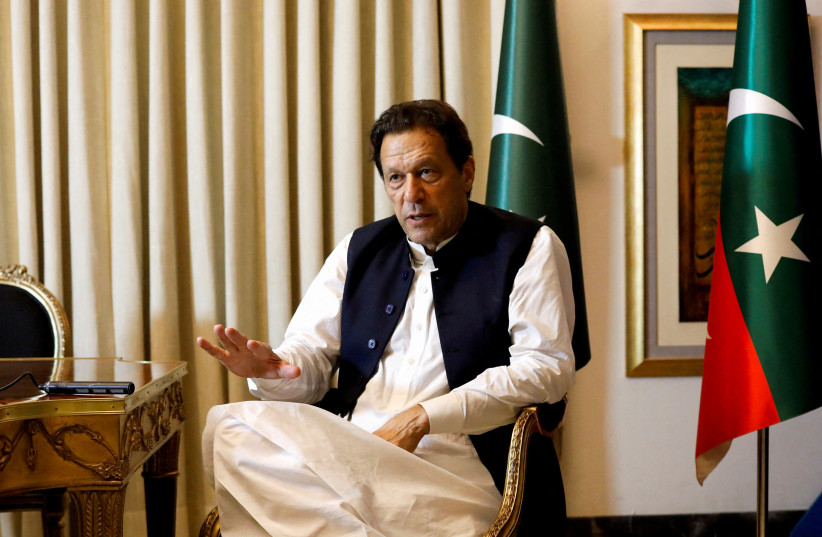The social media platform X, formerly known as Twitter, remains largely inaccessible in Pakistan as the government’s ban on the platform continues for a 10th day.
For more stories from The Media Line go to themedialine.org
The Pakistan Telecommunication Authority (PTA) has yet to provide any clarification regarding the ban.
The initial signs of the X shutdown emerged following social unrest around Pakistan’s recent parliamentary elections. The Pakistan Tehreek-e-Insaf (PTI) party of jailed former Prime Minister Imran Khan declared countrywide rallies against alleged election rigging.
A top official admitted to rigging the election and resigned from his post, further fueling public discord. Pakistan’s election commission has denied the allegations.

Many X users in Pakistan took to the site to condemn the alleged election tampering before access to the site was blocked.
X banned amid controversial election
Access to X in Pakistan was partially restored on Sunday but shut down a few hours later. The site is currently inaccessible.
On Thursday, a high court in Karachi ordered the PTA to fully restore access to X across the country. The court warned authorities that they would face consequences unless they presented specific justifications for the shutdown.
The court has also restrained the PTA from shutting down the internet and other social media platforms and websites.
The order was issued on a petition filed by Abdul Moeez Jafari, which argued that blocking or restricting access to X is “illegal, arbitrary, and contrary to the letter and spirit” of the state constitution.
Ali Muhammad Khan, a senior member of PTI, told The Media Line that he would take the issue to the Islamabad High Court as well. “The dictatorial act of the fascist regime is not acceptable,” he said.
“Freedom of expression is a basic human right,” he continued. “Disabling social media or the internet is not the answer. The people will have to regain their mandate. They will speak the truth and let it come out.”
On Feb. 8, millions of Pakistanis voted for their representatives in the four provincial assemblies and the National Assembly. A long delay in announcing the outcome of the elections followed.
During election day, Pakistan also faced a nationwide shutdown of cellular and internet services despite earlier promises from the PTA and the Interior Ministry to maintain service. The government justified the unprecedented move as an essential security precaution in the wake of recent terrorist incidents.
The digital blackout affected PTI’s digitally driven campaign strategy as well as the electorate’s ability to access crucial voting information. The move sparked widespread criticism from political parties, voters, and international observers.
In the wake of the election, the US has asked Pakistan to lift social media restrictions.
US State Department Spokesperson Matthew Miller told reporters that the US is “concerned by the reports of restrictions on freedom of expression in Pakistan, including the government-imposed shutdowns on social media platforms.”
Sumaira Bukhari, a Rawalpindi-based digital rights activist, said that X was likely blocked to prevent alleged electoral irregularities from being exposed and to prevent Khan’s party from amplifying its message.
“When authorities were shocked by the high-pitched online activity and the support for Khan’s cause among his followers, they banned the platform,” she told The Media Line.
PTI’s official X account currently has a record 10 million followers.
Bukhari criticized caretaker Prime Minister Anwaar ul Haq Kakar for using a virtual private network, a service that can mask one’s location, in order to circumvent the ban and claim on an X post that the country had not imposed a ban on the site.
“The ban not only undermines freedom of speech but also impedes the democratic process by limiting citizens’ access to diverse viewpoints and stifling public discourse,” she said. “To foster a healthy and inclusive democracy, the Pakistani government must respect digital freedoms and uphold the right to freedom of expression both online and offline.”
Syed Jowdut Nadeem, a Punjab-based digital rights activist and member of the Human Rights Commission of Pakistan, told The Media Line that internet outages and bans have deleterious effects on Pakistan’s economy and society.
“These disruptions seriously jeopardize the region’s democratic fabric in addition to interfering with day-to-day activities,” he said.
He noted that the state constitution ensures the right to freedom of expression and said that the pretense of safeguarding national security did not justify the ban.
“The X inaccessibility would indeed have significant implications, especially for young opinion architects who often rely on social media platforms like X to express their views,” he said, adding that mainstream media in Pakistan is seen by many young people as untrustworthy.
“The ban underscores the importance of protecting digital freedoms and ensuring access to online platforms for all citizens,” Nadeem said. “The ban could stifle freedom of expression and undermine democratic values by restricting the flow of information and suppressing dissenting voices.”
Irina Tsukerman, a New York-based national security expert and South Asia analyst, told The Media Line that the X ban was imposed after authorities were caught off-guard by the success of PTI’s campaign.
Pakistan “underestimated the level of popular support for Imran Khan’s party, which, if anything, may have been strengthened by his recent imprisonment over charges that many inside and outside the party believe to have been trumped up to sideline him from politics,” she said.
Tsukerman said it is unlikely that Pakistan will agree to lift the ban and hold election probes, despite international pressure to do so.
“The US is balancing its concerns with the protection of the democratic process with its concerns over local destabilization and the possibility of extremist elements taking advantage of the political impasse,” she said.
